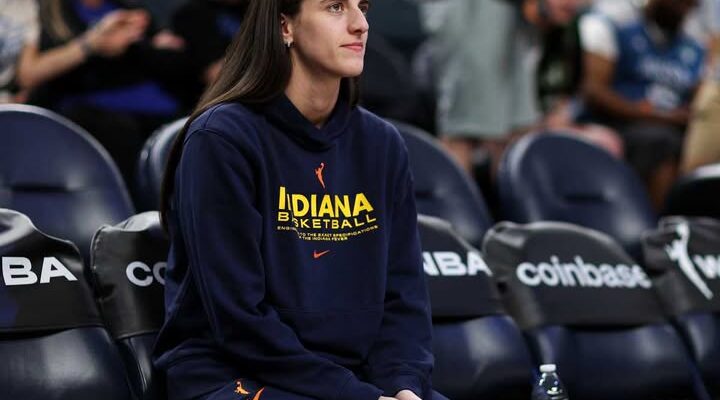In a statement that immediately ignited a firestorm of criticism and disbelief across the WNBA fandom and sports media, ESPN analyst Carolyn Peck asserted that the Indiana Fever are “even more dangerous” without their superstar, Caitlin Clark, on the court due to her current injury absence. This highly controversial take, delivered on ESPN on Thursday, July 3, 2025, came after the Fever’s impressive Commissioner’s Cup victory and a subsequent blowout win over the Las Vegas Aces, both achieved without their generational talent. Peck’s comments have drawn intense backlash, fueling debates about player value, team dynamics, and the often-contentious nature of sports commentary surrounding the WNBA’s most recognizable face.
The exact quote from Carolyn Peck, a former national championship-winning college coach and WNBA veteran, was: “Look, I think that Indiana is even more dangerous when Caitlin Clark doesn’t play because she’s a ball-dominant guard. The ball’s in her hands a lot, so you know what you need to try to take away. But when you look at Indiana now, they’ve got so many weapons.”
Peck elaborated by praising other Fever players who have stepped up in Clark’s absence, specifically mentioning Kelsey Mitchell and Aari McDonald for making plays on the perimeter, and Aliyah Boston in the post. She also highlighted what she perceived as improved defensive intensity, noting, “When you have a point guard like Kelsey Mitchell and Aari McDonald making plays on the perimeter and a post like Aliyah Boston, I’m going to tell you: Indiana, they are a threat. And it’s specifically on the defensive end. Stephanie [White] is so pleased with the intensity they’re bringing defensively with their length, their switches, I mean they’ve wreaked havoc on their last two opponents.”
Caitlin Clark, the No. 1 overall pick in the 2024 WNBA Draft, has been battling injuries in her sophomore 2025 season. She previously missed five games with a left quad strain. More recently, she sustained a left groin injury following the Fever’s June 24 game against the Seattle Storm, which has sidelined her for what became her fifth consecutive game as of Saturday, July 5, against the Los Angeles Sparks. This brings her total missed games this season to ten, compared to only nine appearances.
Despite these absences, Clark has been statistically excellent when on the court, averaging 18.2 points, 8.9 assists, and 5.0 rebounds through nine starts. Her ability to facilitate and stretch the floor remains central to the Fever’s offensive identity.
The Indiana Fever’s recent performance without Clark has been a mixed bag, though certainly improved over earlier stretches in the season. With Clark in the lineup, the Fever held a 5-4 record with an offensive rating of 85.0. Without her, including the Commissioner’s Cup final, they are also 5-4, but with a slightly lower offensive rating of 80.2. They secured a significant 74-59 upset victory over the Minnesota Lynx in the Commissioner’s Cup Championship on July 1, and then followed it up with an impressive 81-54 rout of the Las Vegas Aces on July 3. This recent string of success (three wins in their last four games without Clark) likely fueled Peck’s commentary.
Peck’s “more dangerous” take immediately went viral on social media, drawing widespread condemnation from fans, other analysts, and even some public figures.
- Statistical Disregard: Critics quickly pointed to the obvious statistical impact of Clark’s absence. While other players like Kelsey Mitchell (who scored 25 points against Las Vegas and 32 against Dallas last week) and Aliyah Boston have indeed stepped up, to suggest the team is “more dangerous” without a player averaging nearly 19 points and 9 assists is to ignore basic offensive math. The offensive rating, though only slightly lower without Clark, still indicates less offensive efficiency, not more “danger.”
- “Hater” Narrative: Many fans, particularly Clark’s fervent supporters, interpreted Peck’s comments as yet another instance of a “hater” narrative surrounding the WNBA’s biggest star. Phrases like “Their hatred toward CC needs to be studied” and “ESPN would be a lot more ‘dangerous’ without Carolyn Peck” became common refrains on social media. This perception is amplified by past controversies and debates surrounding Clark’s treatment by some veterans and media members.
- Misunderstanding of Star Power: The argument that a “ball-dominant” player makes a team less dangerous is often a superficial one. While it can be true in some contexts, a player of Clark’s caliber draws defensive attention, creating opportunities for teammates that wouldn’t exist otherwise. Her gravity on the court opens up space for others. To imply that spreading the ball more effectively makes a team “more dangerous” without acknowledging the primary engine that generates those opportunities for others is seen as a flawed analysis.
- Irony of WNBA Growth: Many found the statement ironic given Clark’s undeniable role in the WNBA’s unprecedented surge in viewership, attendance, and merchandise sales. To suggest the league’s most impactful player makes her team less dangerous felt counterproductive to the positive narrative surrounding the WNBA’s growth.
- Historical Context: Peck’s past critical comments about Clark’s game have also been highlighted by fans, leading to accusations of a consistent bias. This history contributed to the intensity of the backlash.
It is true that in the immediate aftermath of a ball-dominant player’s injury, other players often get more touches, leading to a more “balanced” scoring attack. This can sometimes make a team seem more unpredictable for a brief period, as defenses aren’t just focused on one primary threat. Kelsey Mitchell, Aari McDonald, and Aliyah Boston have indeed performed exceptionally well in Clark’s absence, showcasing their own talents and the Fever’s overall roster depth.
However, the long-term ceiling for a team with a generational talent like Clark is almost always higher than one without her. While the Fever’s defense has shown improvement, and their recent wins without Clark are commendable, their overall offensive rating has dipped, indicating less efficiency, not more “danger.” The argument that the team is better or more dangerous without its highest scorer and assist-maker is a difficult one to sustain over a prolonged period.
The controversy surrounding Carolyn Peck’s take highlights the ongoing, often heated, discussions about Caitlin Clark’s impact on the WNBA. While analysis and debate are crucial to sports commentary, this particular assertion struck a nerve, underscoring the deep emotional investment fans have in Clark and the league’s burgeoning success. For many, it felt less like objective analysis and more like an attempt to diminish the value of a player who is undeniably reshaping the landscape of women’s basketball.



